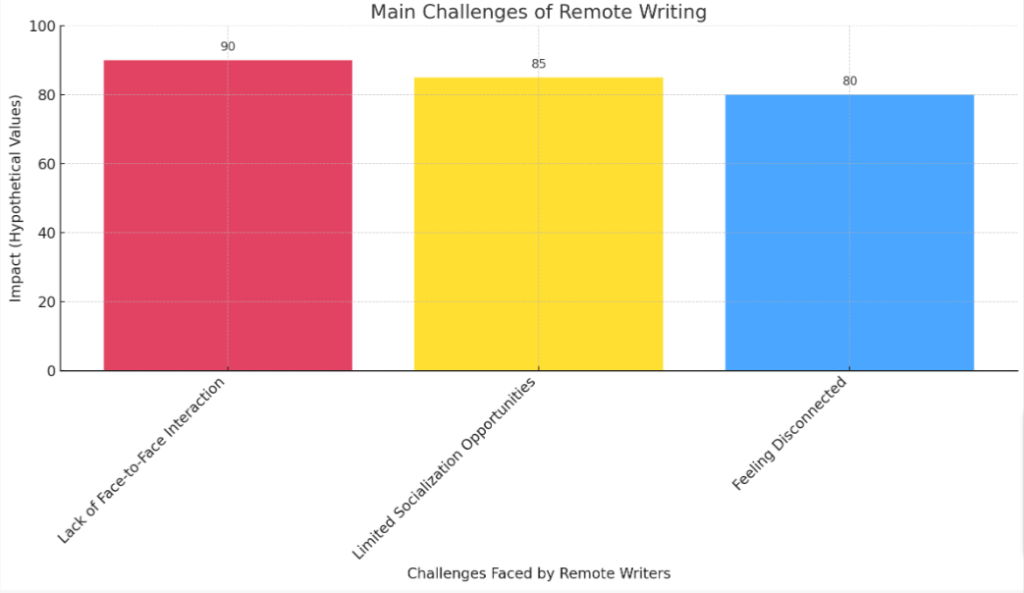Overcoming Isolation: Navigating the Social Terrain of Remote Writing
Are you a remote writer struggling with feelings of loneliness and isolation? You’re not alone – it’s a common issue facing many workers in today’s digital age. This article offers practical tips to help you combat these social challenges, create connections and lead a balanced life as a freelance writer.
Ready for the lonely battle? It starts right now!
Key Takeaways
- Loneliness and social isolation are common challenges experienced by remote writers.
- Lack of face-to-face interaction, limited opportunities for socialization, and feeling disconnected from the outside world are the main challenges faced by remote writers.
- Strategies to combat loneliness include creating a positive workspace, investing in technology, taking breaks and getting out of the house, and joining online communities and forums.
Understanding Loneliness and Social Isolation
Loneliness and social isolation are two closely related but distinct challenges that remote writers often face.
Definitions
Loneliness refers to an emotional state experienced when there’s a difference between the social relationships one would like and what exists in reality. Cronyism often manifests as sadness or despair caused by feeling alone, neglected, or misunderstood.
On the other hand, social isolation is an objective state denoting the lack of contact with other people. It can be driven by circumstances such as being a remote worker and not having regular physical interaction with colleagues or friends.
Causes
The transition to remote work often triggers feelings of loneliness and isolation. Loss of daily face-to-face interactions with colleagues plays a significant role in this effect. Freelance writers, for instance, may feel cut off from the outside world due to limited socialization opportunities.
In addition, working from home blurs the line between professional and personal life, causing additional stress. The absence of physical boundaries might lead some people to overwork themselves, further contributing to their sense of seclusion.
Sometimes social connections get lost amidst these practical difficulties making writers more susceptible to feeling isolated.
Effects
Loneliness can become a heavy burden for remote writers, impacting both their mental and physical health. Prolonged periods of isolation may lead to serious health problems such as depression, anxiety, heart disease, and more.
Remote work exacerbates the sense of isolation due to limited opportunities for socialization and lack of face-to-face interaction.
The state of loneliness also affects a person’s productivity levels while working from home. It could create distractions that hamper focus on tasks at hand leading to poor performance in writing assignments.
Staying connected becomes an uphill task as well-absence from physically engaging environments often leads to feelings of being disconnected from the outside world.
The Challenges of Remote Writing
Remote writing poses several challenges, including a lack of face-to-face interaction, limited opportunities for socialization, and a feeling of disconnection from the outside world.

Lack of face-to-face interaction
Remote writing can be a lonely endeavor due to the lack of face-to-face interaction. Without regular in-person contact with colleagues or clients, remote writers may feel isolated and disconnected.
This absence of personal connection can make it challenging to establish rapport, brainstorm ideas, or collaborate effectively. The inability to read nonverbal cues and body language can also hinder communication and lead to misunderstandings.
Remote writers must find alternative ways to bridge this gap and foster meaningful connections through technology and virtual meetings. By actively seeking opportunities for social interaction, remote writers can combat feelings of isolation and create a supportive network that enhances their professional journey.
Limited opportunities for socialization
Remote writing can be a solitary endeavor, with limited chances for socialization. Unlike traditional office settings, where coworkers are just a few steps away, remote writers often find themselves working in isolation.
This lack of face-to-face interaction can lead to feelings of disconnect and loneliness. Without co-workers around to chat with or bounce ideas off of, remote writers may struggle to build meaningful relationships and feel like they are missing out on the camaraderie that comes with working in a team.
However, there are strategies that remote writers can employ to combat this challenge and foster social connections despite their physical separation from others.
Feeling disconnected from the outside world
Remote writers often struggle with feeling disconnected from the outside world. This arises due to the lack of face-to-face interaction that comes with working remotely. Without daily interactions in a traditional office setting, remote writers may feel isolated and cut off from social connections.
The absence of colleagues and casual conversations can make it challenging to foster a sense of belonging, leading to feelings of loneliness and disconnection. It is important for remote writers to find ways to combat this by actively seeking out opportunities for socialization and staying connected through online communities and forums.
Coping Strategies for Remote Writers
Create a positive workspace, invest in technology, take breaks and get out of the house, join online communities and forums – learn how to combat loneliness as a remote writer!
Creating a positive workspace
A positive workspace is essential for remote writers to combat loneliness and maintain productivity. Here are some ways to create a conducive work environment:
- Organize your workspace: Keep your desk clutter-free and have designated spaces for different tasks.
- Personalize your surroundings: Add elements that inspire you, such as motivational quotes, plants, or artwork.
- Let in natural light: Position your desk near a window to bring in natural sunlight, which boosts mood and energy levels.
- Use ergonomic furniture: Invest in a comfortable chair and desk setup to prevent body aches and improve focus.
- Establish boundaries: Set clear work hours and communicate them to family members or roommates to avoid distractions.
- Minimize noise disruptions: Use noise-canceling headphones or play soft background music if silence is hard to achieve.
- Maintain cleanliness: Regularly clean your workspace to promote a sense of order and reduce stress.
- Incorporate breaks: Take short breaks throughout the day to stretch, move around, or engage in relaxing activities like meditation or deep breathing exercises.
Investing in technology
Investing in technology can be a game-changer for remote writers battling loneliness. By utilizing modern tools and resources, writers can bridge the gap between isolation and connection.
With just a computer and an internet connection, they can tap into a world of possibilities. Online communication platforms like video conferencing apps allow for face-to-face interaction with clients or fellow writers, creating a sense of presence even from afar.
Social media platforms provide opportunities to join writing communities and engage in discussions that foster a feeling of belonging. Through investing in technology, remote writers can break free from the burden of loneliness and build meaningful connections in their virtual workspaces.
In addition to online tools, there are various other ways investing in technology aids remote writers’ quest for social interactions during their working day. Writing productivity apps like Scrivener or Evernote streamline workflow efficiency while also offering features such as collaboration capabilities and shared document editing among team members or co-writers.
Taking breaks and getting out of the house

Taking breaks and getting out of the house are essential for remote writers to combat loneliness and maintain their well-being. Here are some strategies to consider:
- Embrace regular breaks: Break up your workday with short, scheduled breaks. Use this time to stretch, walk around, or do something unrelated to work.
- Incorporate physical activity: Step outside and go for a walk or engage in a quick exercise routine during your break. Physical activity can boost mood and reduce feelings of isolation.
- Explore outdoor spaces: Take advantage of nearby parks, gardens, or nature trails. Spending time in nature has been shown to improve mental health and alleviate feelings of loneliness.
- Meet up with others: Arrange meetups or coffee dates with friends, family, or fellow writers in your area. It provides an opportunity for social interaction and helps you feel less isolated.
- Join local networking events: Attend local writing workshops, conferences, or meetups to connect with other writers and expand your professional network.
- Work from different locations: Occasionally work from a coffee shop, library, or coworking space instead of your home office. Changing your environment can provide a sense of novelty and alleviate feelings of isolation.
- Volunteer your time: Look for volunteer opportunities that align with your interests or skills. Helping others can boost self-esteem and create a sense of purpose outside of work.
Joining online communities and forums
Joining online communities and forums can provide remote writers with opportunities to connect with others in their field, share experiences, and seek support. It allows them to engage in conversations, ask questions, and exchange ideas with like-minded individuals. Online communities and forums also provide a platform for networking and collaboration, where writers can find potential clients or professional opportunities.
Additionally, these platforms often offer resources, advice, and feedback that can help remote writers improve their skills and stay motivated. So don’t hesitate to join these virtual communities and forums – they can be a valuable source of connection and support for remote writers.
Conclusion: You Are Not Alone
Don’t forget that you are not alone in battling loneliness as a remote writer. Stay connected and combat isolation by acknowledging the importance of social connections and taking steps to actively engage with others.
Importance of acknowledging and addressing loneliness
Loneliness can have a profound impact on our mental and emotional well-being, especially for remote writers. It is important to acknowledge and address feelings of loneliness because it can lead to isolation, decreased productivity, and even health problems.
By recognizing the significance of loneliness in remote work, we can take steps to combat it. This includes creating a positive workspace that promotes social connection through methods like joining online communities and forums.
Additionally, investing in modern technology allows us to stay connected with others and alleviate feelings of isolation. Taking frequent breaks and getting out of the house also help maintain a sense of belonging by engaging with the outside world.
Tips for staying connected and combating isolation
To combat isolation and stay connected while working remotely, consider the following tips:
- Foster a strong online presence through social media platforms and professional networking sites.
- Engage in virtual meetings and video conferences to maintain face-to-face communication with colleagues or clients.
- Join online writing communities and forums to connect with fellow writers and discuss common challenges.
- Participate in virtual workshops or webinars to expand your knowledge and network with like – minded individuals.
- Schedule regular check – ins with friends, family, or mentors to ensure you have social interactions outside of work.
- Make time for physical activities or hobbies that allow you to step away from your computer screen and engage in the world around you.
- Consider co – working spaces or coffee shops where you can work alongside others on occasion for a change of scenery.
- Attend industry events or conferences, either in person or virtually, to connect with professionals in your field.
- Seek out opportunities for collaboration on writing projects, such as co – writing articles or joining writing groups.
- Prioritize self-care by prioritizing breaks, setting boundaries, and maintaining a healthy work-life balance.
The support of family, friends, and colleagues
Family, friends, and colleagues can play a crucial role in the lives of remote writers. They provide a much-needed support system that helps combat feelings of loneliness and isolation.
Having loved ones who understand the challenges of remote work and are there to offer encouragement can make a world of difference. Friends and colleagues can provide social interaction through virtual meetups or chats, offering opportunities for connection even when physical distance separates them.
By maintaining these relationships, remote writers can find solace in knowing they have people who truly understand and support their journey.

